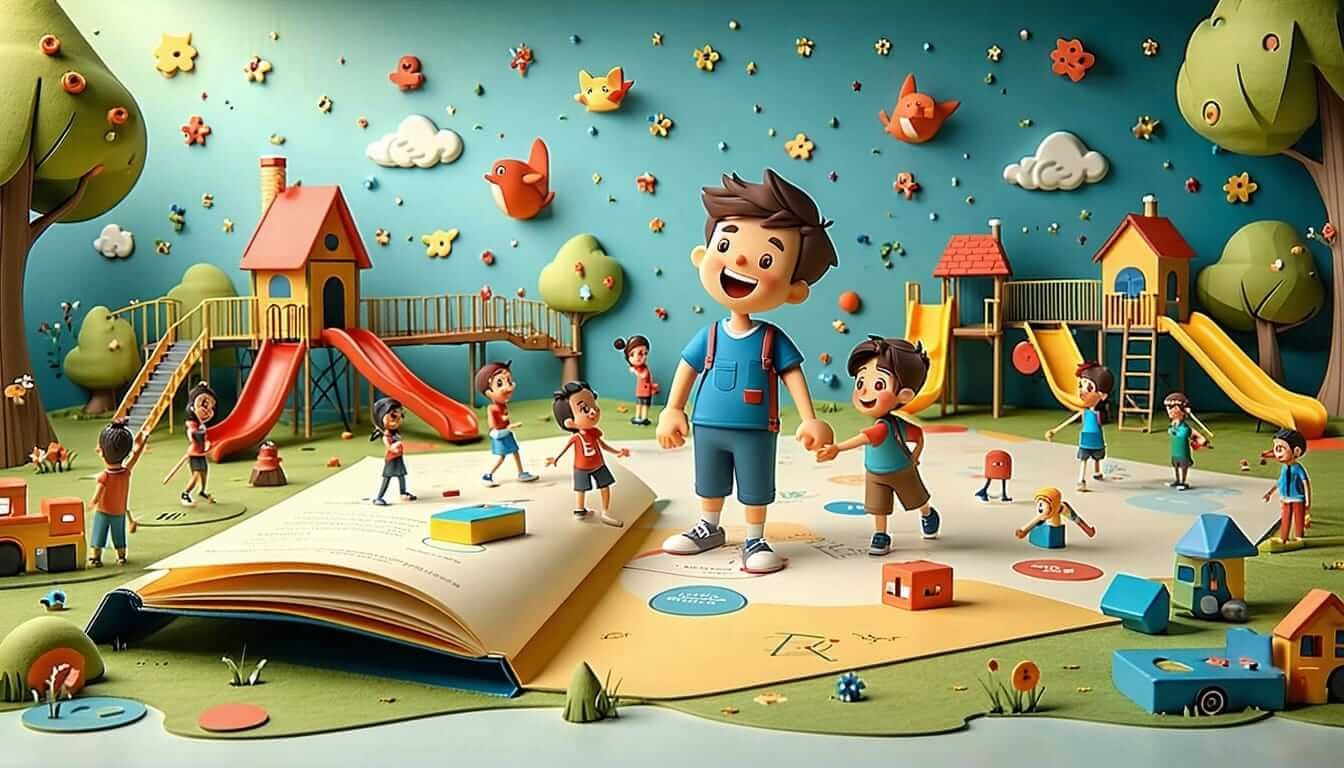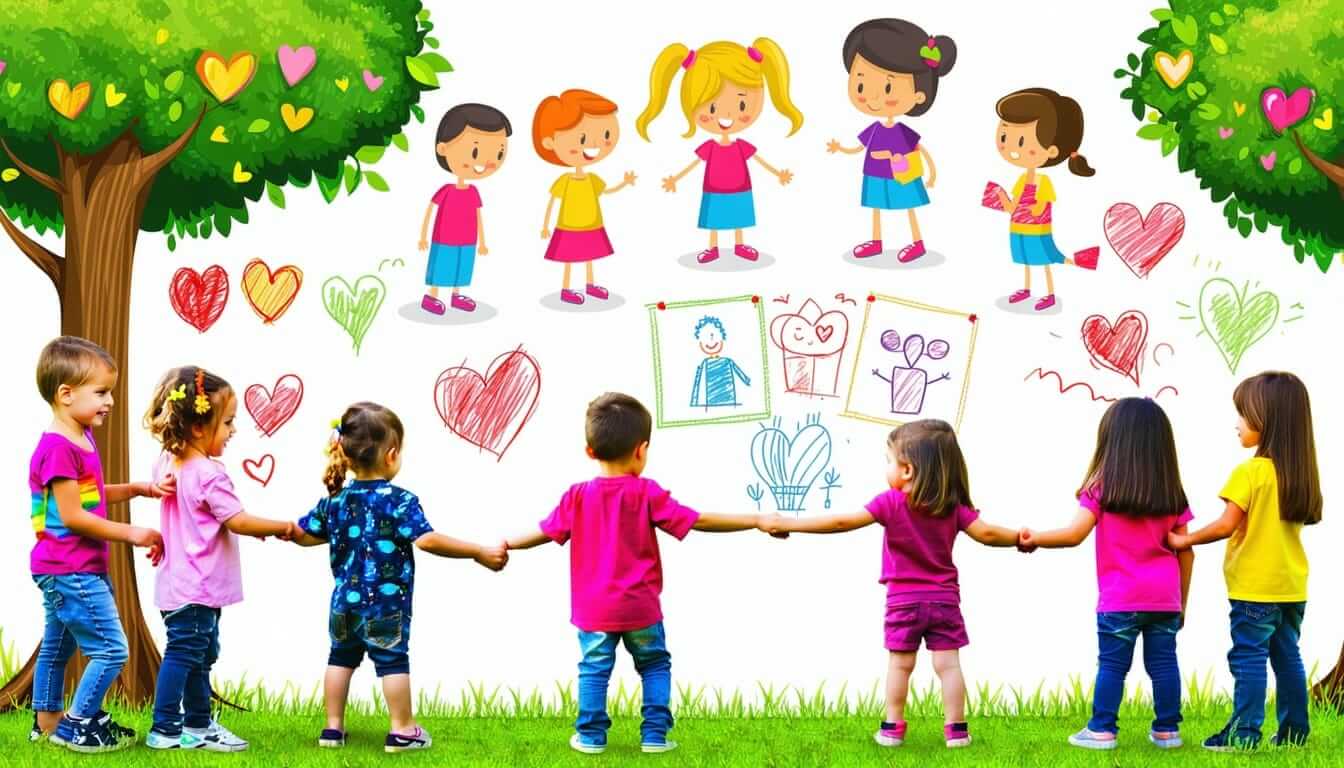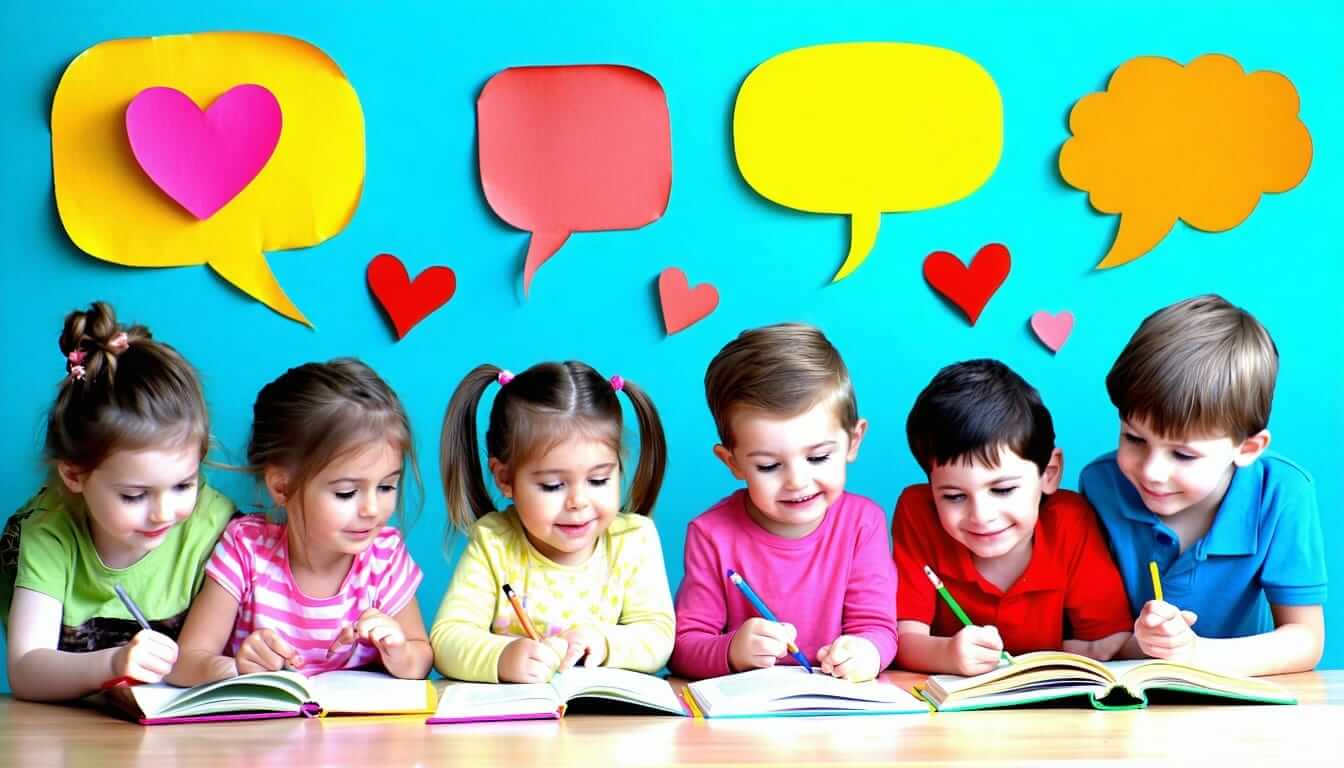Teaching Respect Through Everyday Interactions
Raising respectful children doesn’t just happen overnight—it’s woven into daily life like threads in a tapestry. This means chatting in ways that show respect and nudging your kids towards feeling for others and trying to see things from their side of the fence.
Cultivating Respectful Communication
At its core, teaching respect is like nailing the art of a good chat. You should show how it’s done by speaking politely, really listening to what’s being said, and locking eyes now and then. Set your home’s communication rules. Encourage your kiddos to slip in “please” and “thank you”, and when they’re sharing what’s on their mind, guide them to do so nicely.
Spice it up with some activities that make your conversations shine. Think about having a family chat tradition, like passing around a “talking stick” where the stick-bearer has the floor. This little ritual teaches everyone to really listen and gives everyone a fair turn.
| Communication Strategy | What It Means |
|---|---|
| Active Listening | Really give your ears to whoever’s talking; don’t rush to think what to say next. |
| Polite Language | Get those “excuse me’s” and “can you help me’s” rolling off the tongue. |
| Family Discussions | Carve out time for family meetings where everyone spills the beans. |
Want more cool ideas? Peek at our respect activities for kids for inspiration.
Encouraging Empathy and Understanding
Getting kids to see things from others’ shoes is huge for respect. Dive into storybooks that show all sorts of walks of life, and have a natter about the characters’ feelings and what they might do next. Ask your little one to think about how they’d feel in similar shoes, helping them get in touch with their own empathy.
Explore some emotion-guessing games which make spotting and dealing with feelings fun. “Emotion Charades” is great—kids act out feelings with just their faces and bodies. It’s like teaching them a secret language for emotions (Positive Action).
Teamwork is the next stop on this ride. Get the kiddos building something together, like a tower of blocks. They turn-take, swap ideas, and see the world through each other’s eyes—cooperation 101 (Positive Action).
When life’s little dramas pop up, use them to talk about patching things up and why peeking into someone else’s feelings matters.
Want more ways to slide respect into your teaching moments? Head over to our piece on teaching respect to children and dig into activities that pump up that empathy and understanding.
Establishing Character-Building Foundations
Building good character in your child starts with laying down solid groundwork. Two important parts of this are showing positive behavior and having chats about goals together.
Role Modeling Positive Behavior
Kids learn tons by watching us. When you show them what positive behavior looks like, you’re giving them a playbook to follow. Being respectful and empathetic are not just buzzwords; they’re vital traits, and you’ve got to walk the talk. Discuss topics like respecting others with an honest, respectful tone. North Central College points out that kids often copy what they see adults doing.
Share a story or two about times when you had a tough situation and chose to handle it the honest way. Let your child share feelings, too. Chat about what being respectful looks like in various scenarios. It’s about making respect a habit, not just a talk.
Setting and Revisiting Goals
Setting goals with your child can play a big role in their character development. It gives them a map for weaving values like respect and kindness into their daily lives.
Start by picking character traits or behaviors to work on. Here’s how you might break it down:
| Goal | Action Steps | Talk About It When? |
|---|---|---|
| Listen without interrupting | Weekly family heart-to-hearts | Weekly |
| Be kind to everyone | Volunteer as a family | Monthly |
| Appreciate what you’ve got | Write in a gratitude journal | Daily |
Keep the convo going by checking in on these goals often. Talking about how things are going reinforces their importance and nudges your child to think about their actions. This routine helps them stay on track for their personal growth journey.
Weaving these character-building steps into everyday life will help cement those values strongly within your child. Need more tips? Look into activities that promote respect for kids or ways of teaching respect to children. These small steps all add up to a bigger picture of understanding respect and building strong character.
Fostering Community and Belonging
Helping your child feel connected is key to their personal growth. When you nudge them towards volunteering and soak them in stories about character, you lay the groundwork for developing traits like empathy and responsibility, which are golden for both social and emotional development.
Promoting Volunteerism
Getting your kid involved in volunteer work can really light up their character. When they step out to lend a hand, they’re not just helping others—they’re growing some awesome attributes like empathy and responsibility.
Below are some volunteer ideas you can jump into as a family—team effort!
| Volunteer Activity | Description |
|---|---|
| Food Drives | Gather and give food to local shelters. |
| Park Cleanups | Lend a hand in tidying up your local parks. |
| Tutoring Programs | Support kids needing academic help. |
| Animal Shelters | Look after animals waiting for a home. |
Volunteering is a fantastic way for kids to learn patience, generosity, and gratitude (Emeth Gymnastics). It strengthens the feeling of community and reinforces family bonds since you’re all in it together!
Incorporating Relevant Readings
Books can be a great way to teach kids about values. Share stories focused on character development to give them a peek into diverse perspectives.
Here’s a list of books that pack a powerful punch:
| Book Title | Key Themes |
|---|---|
| “The Giving Tree” by Shel Silverstein | Generosity and selflessness |
| “Have You Filled a Bucket Today?” by Carol McCloud | Kindness and positive behavior |
| “The Invisible Boy” by Trudy Ludwig | Inclusion and empathy |
When you chat about these stories, they may start viewing the world a bit differently and could apply these lessons to their own lives. This can definitely help when you’re teaching respect to children.
By getting your child to mix it up with the community and dive into character-rich stories, you’re giving them life skills they’ll thank you for down the road. They’ll grow emotionally intelligent and learn to build friendships that will endure the test of time.
Classroom Activities for Character Development
Helping kids build character doesn’t have to be a snooze fest. Dive into activities that pack in fun while teaching valuable traits like respect, empathy, and teamwork. Here are two nifty ways to get the ball rolling.
Early Childhood Dramatic Play
Dramatic play, AKA the magic of pretending, is a gem in early childhood circles. When kids jump into imaginative roles, they’re not just having fun—they’re sharpening cognitive and social skills too. Allowing them to act out different scenarios and feelings helps them manage emotions, stress, and the whole friendship game.
Here’s why dramatic play rocks:
-
Brain Power Boost:
Kids learn to solve problems and think on their feet as they play out make-believe adventures. -
Making Friends:
It’s practice central for important social moves like sharing, taking turns, and putting themselves in others’ shoes—a must for getting along. -
Chit-Chat Skilz:
With every “And then what happened?”, children expand their vocabulary and learn to express their thoughts more clearly.
Here’s how you can bring a bit of drama into your living room:
| Activity | What’s It About? |
|---|---|
| Pretend Scenarios | Transform your living room into a supermarket or a spaceship and watch as kids jump into different roles. It’s empathy work in disguise! |
| Storytime Acts | Prompt your kid to spin tall tales and act them out. Boosts both their talking and showing skills. |
| Puppets Galore | Let them handle emotions with puppets. It’s a fun segue into conversations about feelings. |
By exploring other worlds in dramatic play, kids don’t just learn about feelings—they learn respect by getting how social dynamics work in a safe, get-creative kind of way.
Social Skills Games and Activities
Want to transform your child’s playtime into a character-building workshop? Stir in some games focusing on social skills. These are packed with opportunities for turn-taking, teamwork, and problem-solving—secret ingredients for respect and cooperation.
Some go-to social skill games are:
| Game | What’s the Deal? |
|---|---|
| Teamwork Puzzles | When children piece together puzzles, they learn how pulling in the same direction makes things click. |
| Buddy-Up Tasks | From constructing forts to helping with dinner prep, working hand-in-hand fosters negotiation and idea respect. |
| Emo-Charades | Toss a twist on classic charades by acting out emotions. Pave the way for chats about understanding and empathy. |
As you play, encourage your child to chat about what went well and how they can make their teamwork sparkle even more. It’s all about rooting those ‘understanding and respect’ seeds in everyday escapades.
For more inspiration, hop over to respect activities for kids and teaching respect to children. Your eager participation plays a huge role in weaving these values into your kid’s day-to-day life.
Parental Role in Character Education
Importance of Parental Influence
Being a parent is a big deal. Your kid’s character is like a soft ball of clay in your hands, and you’re the sculptor. Researchers back you up on this—you’re your kid’s first hero and the one who shapes them the most. When you guide your child in character building, you’re actually giving them a sort of armor to handle life’s curveballs. Starting this early lays down the bricks for strong qualities like courage, self-control, and bouncing back from failure.
Character is not something you just talk about once and forget; it’s built through the messiness of doing, messing up, and learning. This adventure you take with your kid can embed strong traits crucial for building deep connections with others. Here’s a quick look at how you, yes you, can influence character growth:
| Character Trait | Parental Influence |
|---|---|
| Confidence | Letting kids be themselves and solve problems makes them sure of who they are. |
| Resilience | Being there when things get tough teaches them how to bounce back. |
| Empathy | Show them empathy, and they’ll learn to walk in others’ shoes. |
When you teach respect and good habits, you’re not just setting your kid up for success, but also helping iron out some of the world’s wrinkles that come from people not getting along (Emeth Gymnastics).
Volunteering as Family Character Building
Getting the family together to volunteer isn’t just a kind gesture—it’s a grand slam for character development. These experiences pivot children’s focus to think about others, sharpen problem-solving skills, and build those bridges to lasting friendships. Doing good stuff together packs your family tighter, all the while sowing seeds of kindness, patience, selflessness, and being thankful (Emeth Gymnastics).
Need some ideas to jumpstart the giving spirit?
| Volunteering Activity | Benefits |
|---|---|
| Helping out at shelters | Fosters compassion and lets them see life from a new angle. |
| Joining in on community clean-ups | Teaches ownership of their space and boosts pride in their surroundings. |
| Spending time at nursing homes | Nurtures empathy and respect for older generations. |
| Organizing fundraising shindigs | Fires up teamwork and puts others first. |
Making these moments a regular thing in your house is one of the smartest character-building moves you can pull off. Through these snapshots of giving, kids gain solid insights into respect and empathy. And as they step out into the world, they’ll be ready for life’s chaos, with connections they’re proud of tucked in their pockets.
School-Based Initiatives for Character Development
Helping students grow into decent human beings, that’s what schools strive for, right? When schools mix values right into their lessons, kids start picking up on positive traits like respect without even realizing it. Teachers, with a sprinkle of magic here and a dash of care there, become the real influencers—guiding kids to become respectful and honest individuals.
Values-Based Curriculum Integration
Sneaking good values into everyday schoolwork? Genius. It’s like hiding veggies in mac n’ cheese; they won’t even know they’re learning. By mixing courage, integrity, and respect right into the heart of every lesson, teachers make sure those values stick with the kids long after the bell rings.
| Key Values | Benefits |
|---|---|
| Courage | Gives kids the guts to tackle whatever life throws their way. |
| Integrity | Encourages them to keep it real, standing up for what’s right. |
| Respect | Nurtures a classroom vibe where everyone feels they belong. |
Teaching these good ol’ life lessons pushes kids a notch higher—not just in grades but in growing up to be all-around awesome people. Discussions about values help them look inwards and ponder their own choices. Want some cool activities to make it stick? Check out our respect activities for kids.
Structured Character Development Programs
Programs like PATH TO HONOR from the Medal of Honor Foundation? They’re like boot camps for good values, packed with real-life lessons over mere textbook theory. Kids dive deep into learning about sacrifice, service, and owning up to their responsibilities (Congressional Medal of Honor Society).
These setups teach by doing—no snooze-fest lectures. When students engage with character education, qualities like respect and empathy sprout naturally in their interactions (Congressional Medal of Honor Society).
Parents, don’t just stand on the sidelines. Jump in with both feet and help something amazing grow. Check out teaching respect to children to extend those teachings at home or explore tips like how to teach respect to toddlers. Teaming up, schools and family can whip up a nurturing setup where character blossoms.





0 Comments